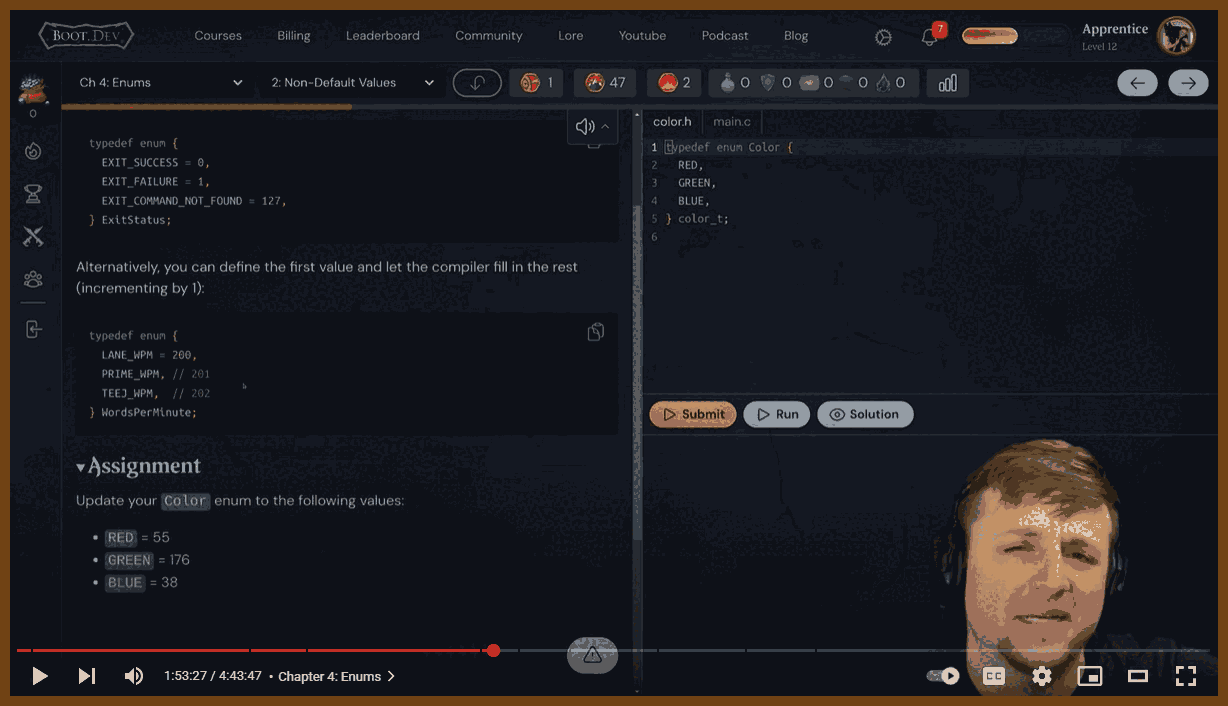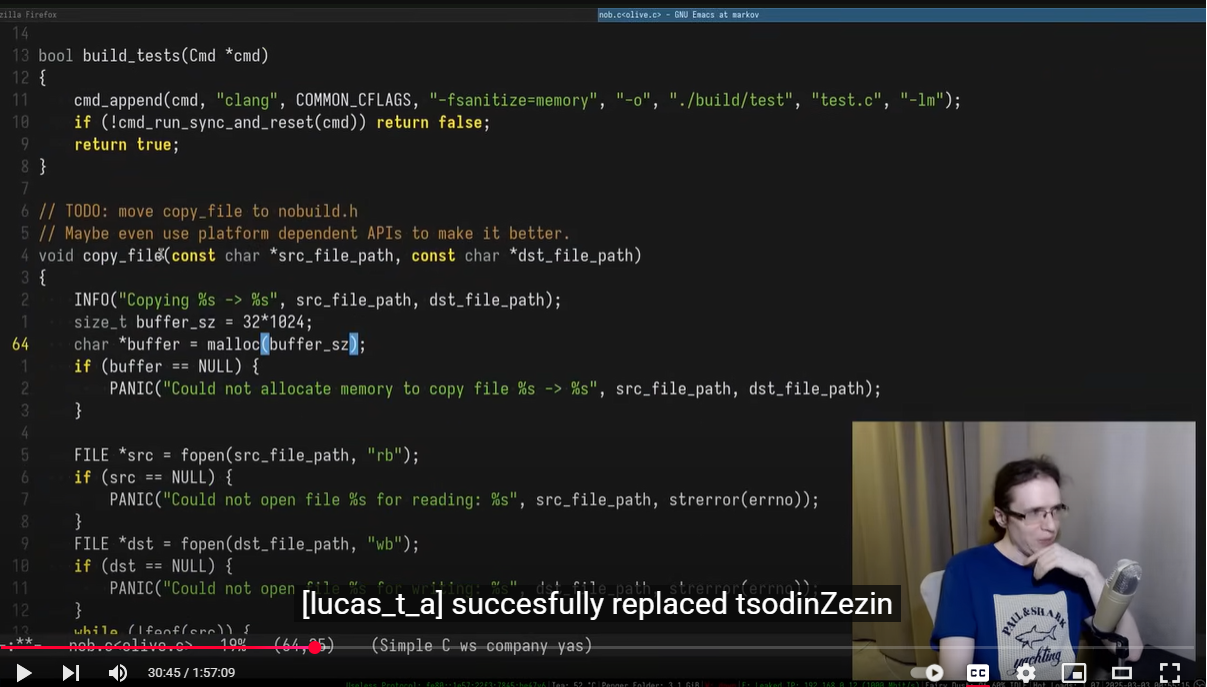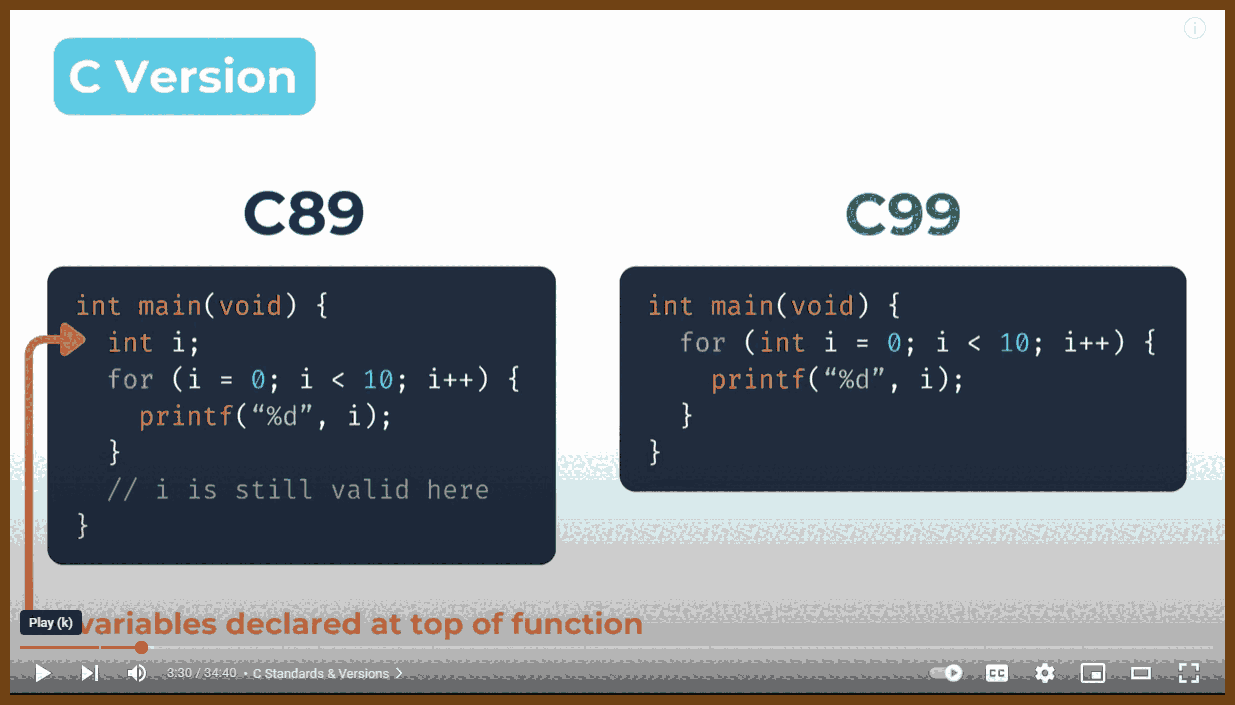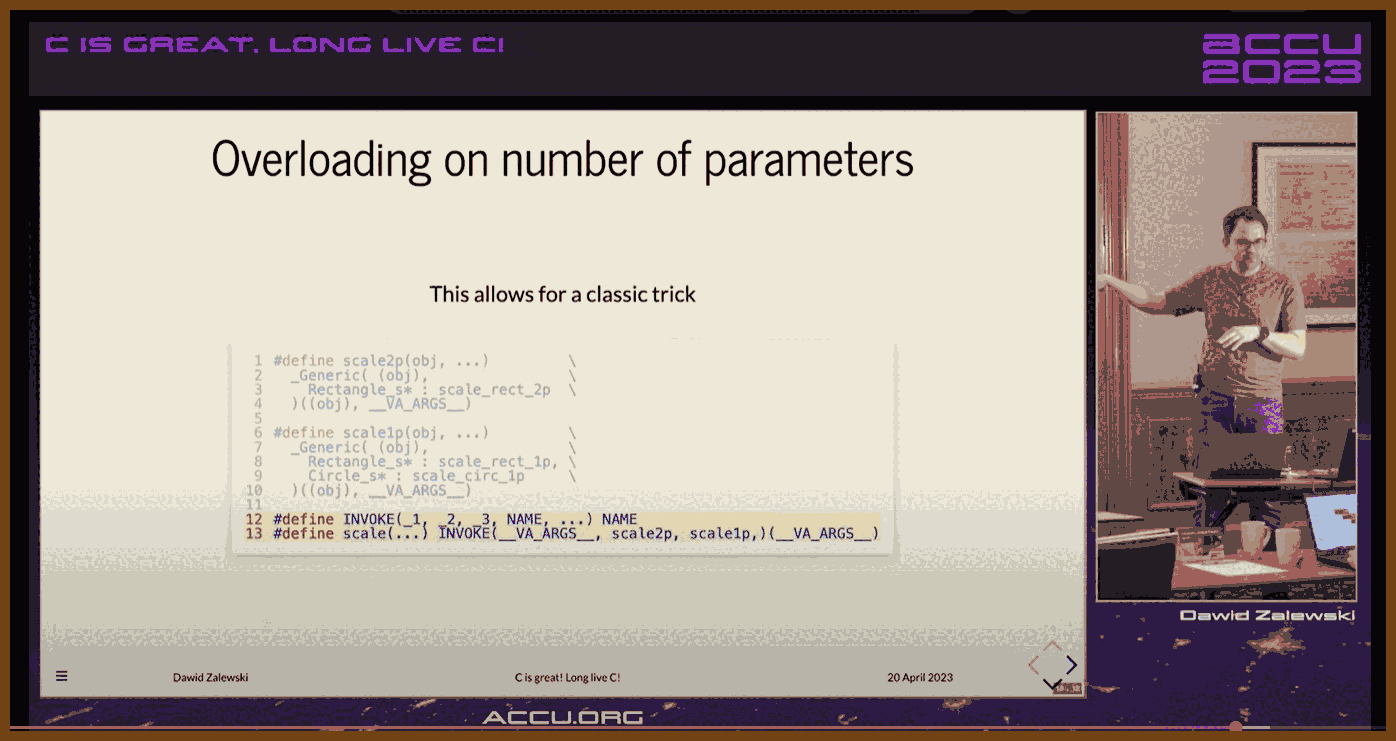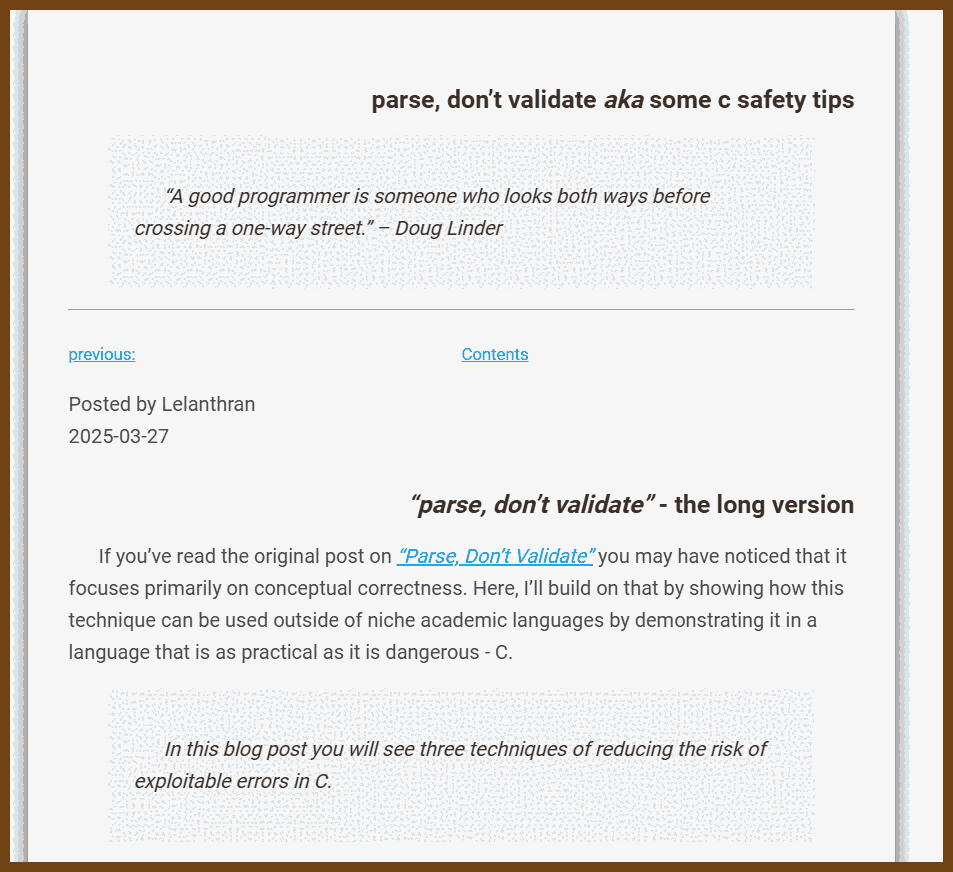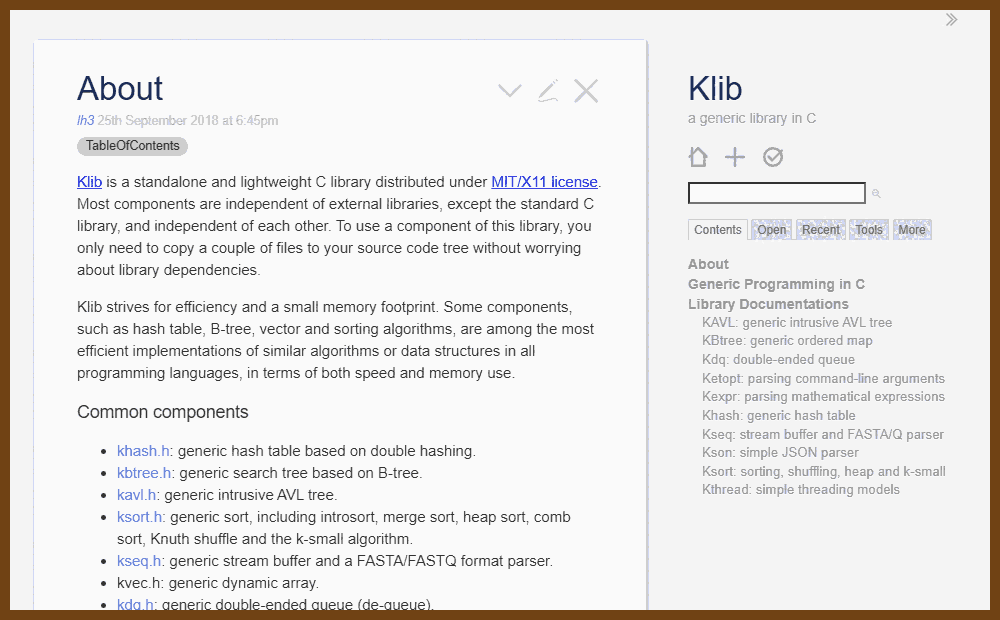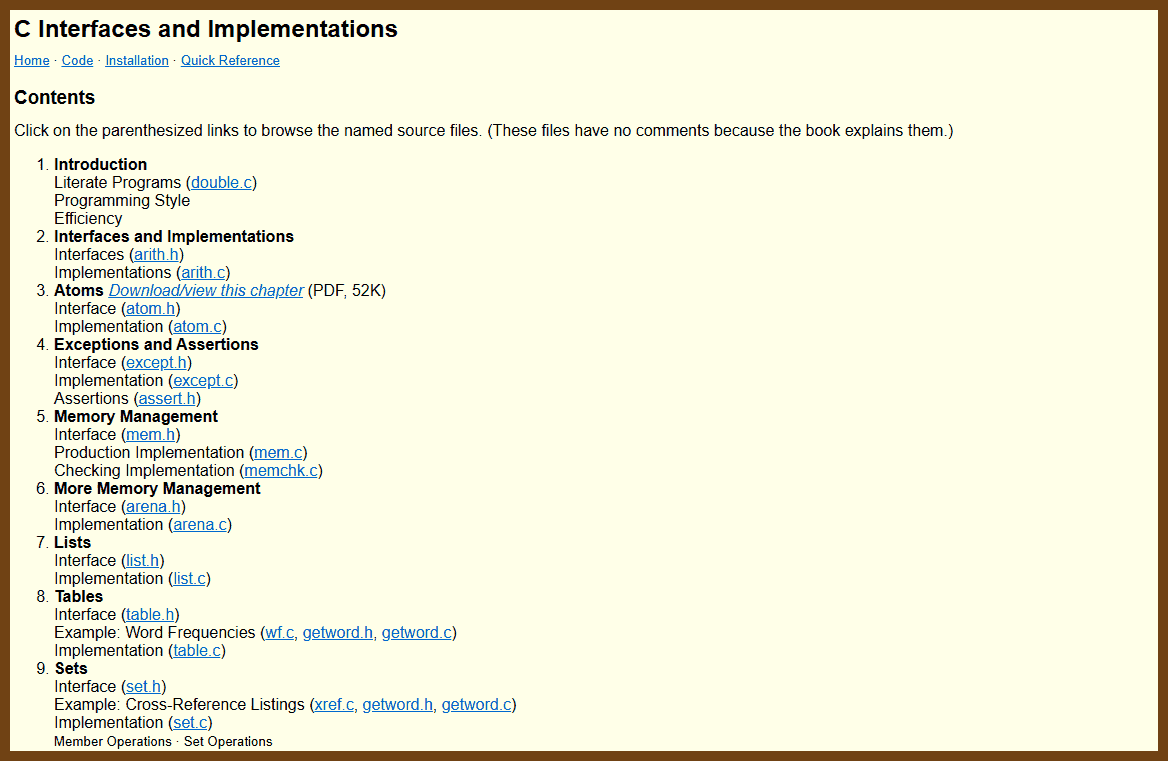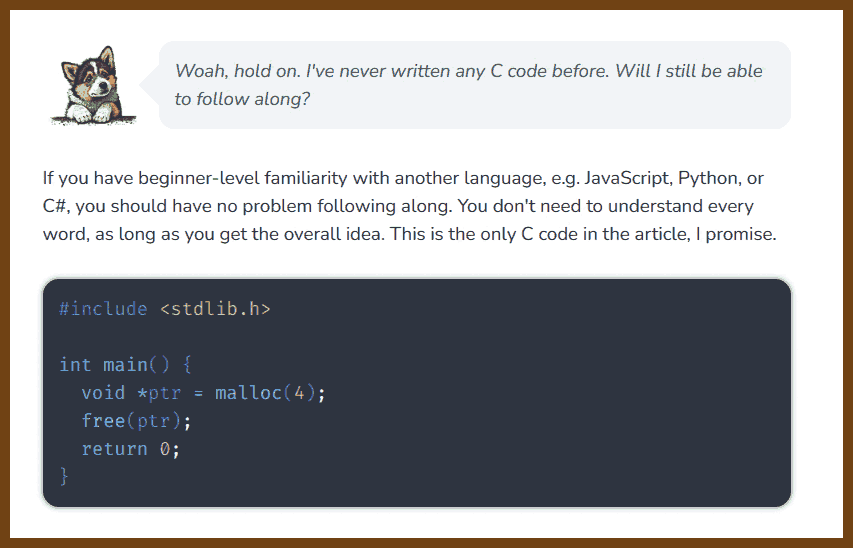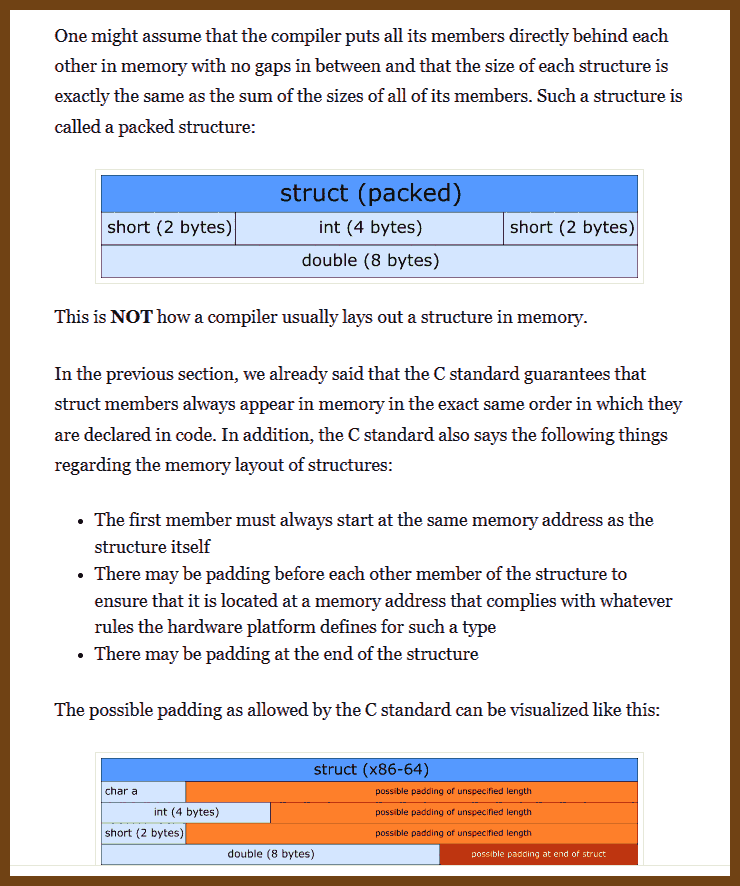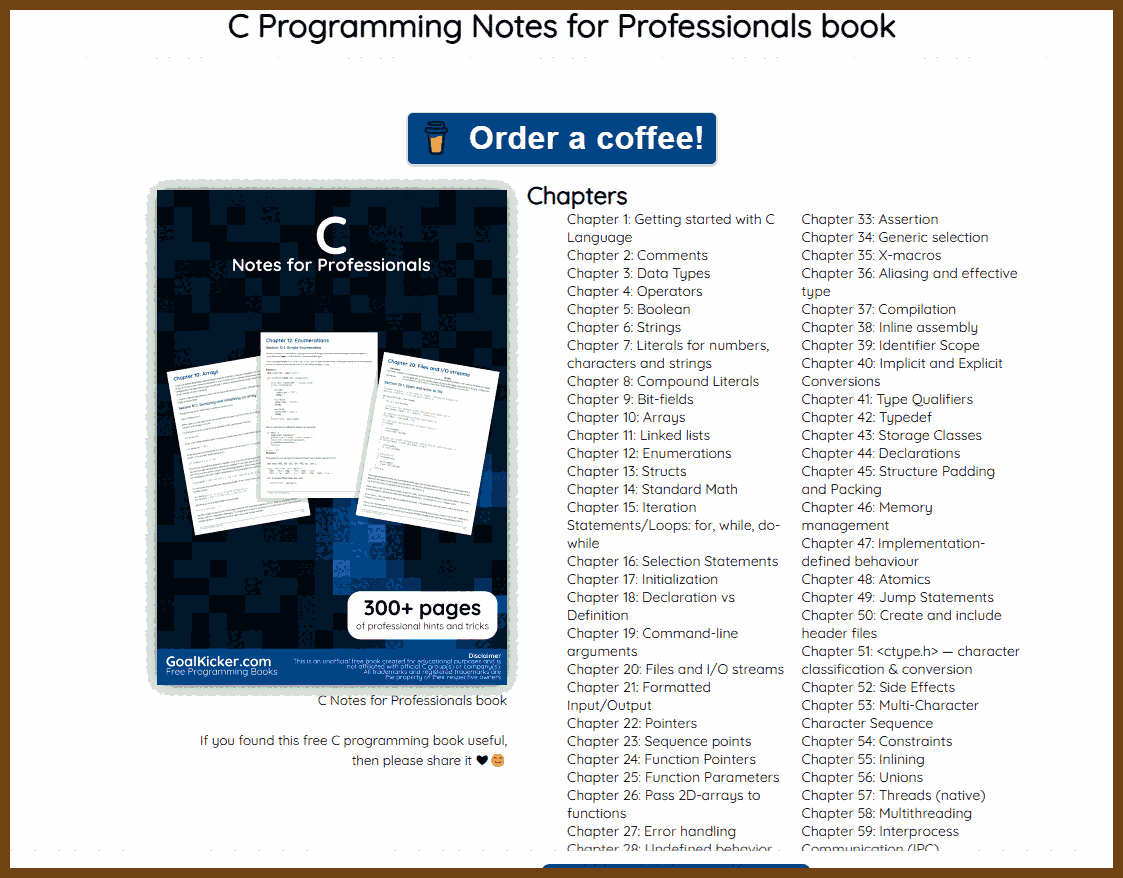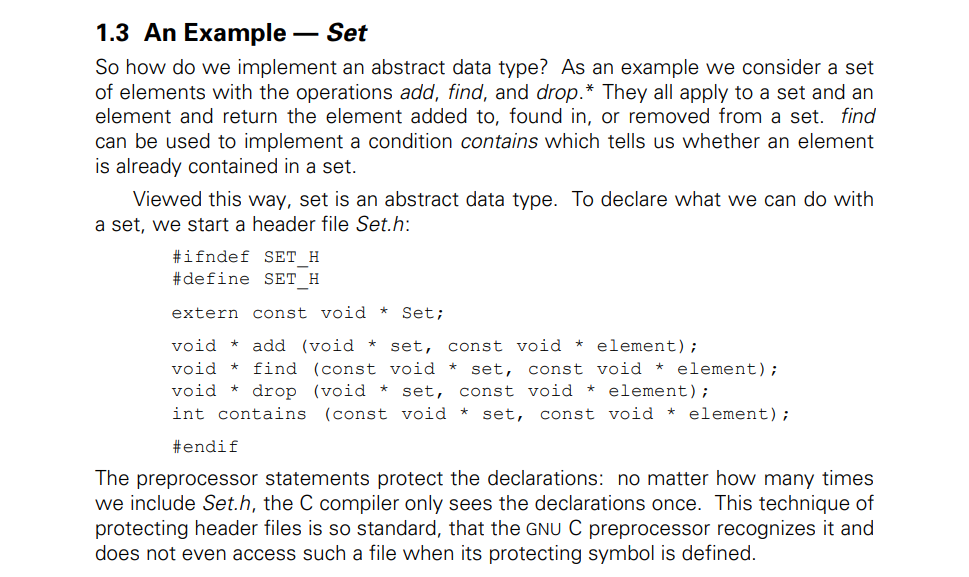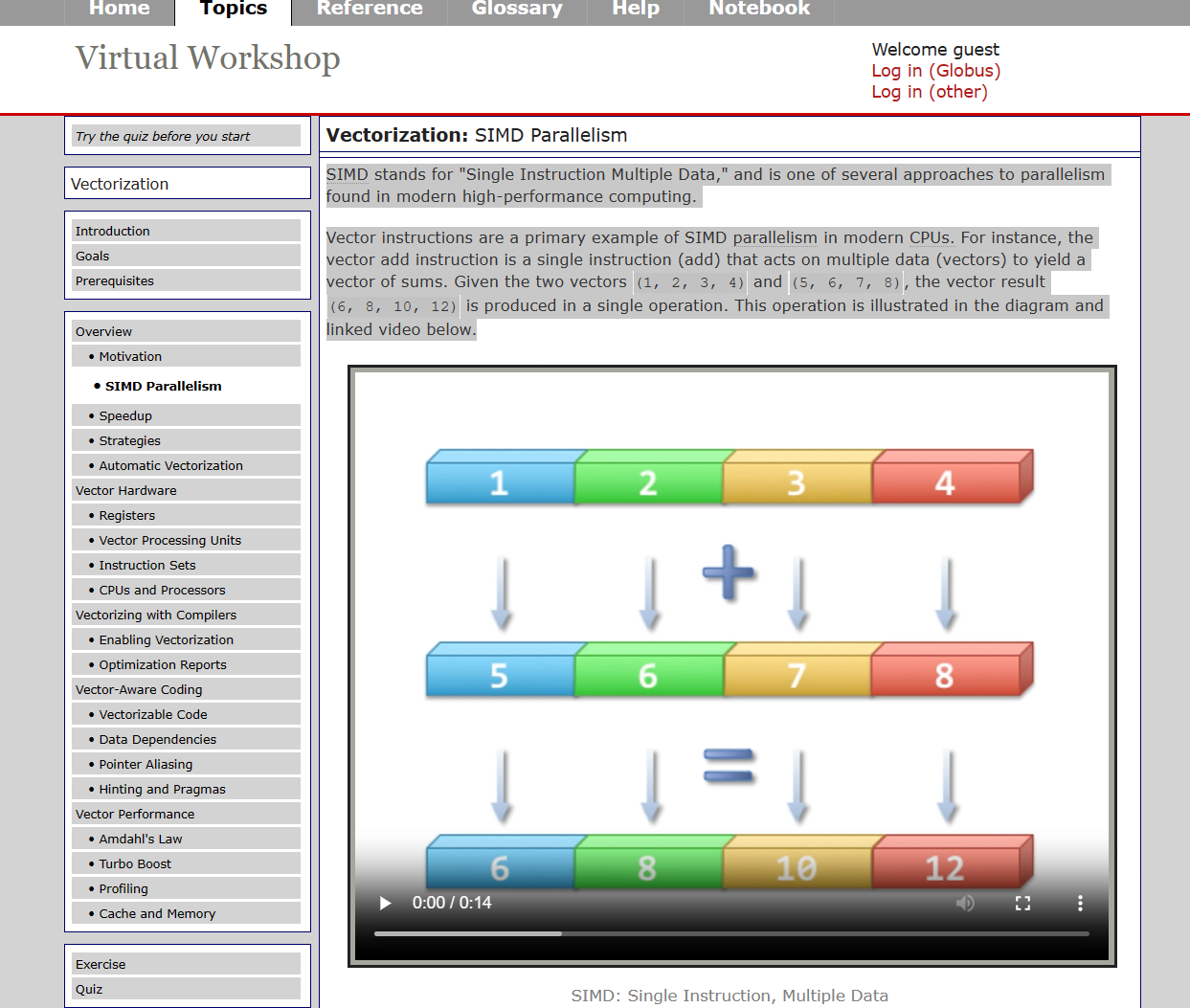dev-c99
Date: 2025-09-03
[[TOC]]
Compilation and warnings
# Clang on Unix-like systems
clang -std=c99 -Wall -Wextra -Werror -O2 -g main.c -o main
This compiles main.c as C99 with Clang, enables many warnings (-Wall), adds extra diagnostics (-Wextra), and promotes all warnings to errors (-Werror). -O2 optimizes, -g keeps symbols for debugging, and -o main names the output. Clang Command Guide
# GCC on Unix-like systems
gcc -std=c99 -Wall -Wextra -Werror -O2 -g main.c -o main
This compiles main.c as C99 with GCC. -Wall, -Wextra, and -Werror control diagnostics; -O2 and -g set optimization and debug info; -o names the output. GCC Warning Options
:: MSVC cl.exe on Windows Developer Command Prompt
:: Note: cl.exe does not have a C99 mode switch. It can compile C code, but full C99 conformance is not guaranteed.
cl /TC /W4 /WX /Zi /O2 main.c /Fe:main.exe
This compiles main.c as C with MSVC. /TC forces C mode, /W4 is a high warning level, /WX treats warnings as errors, /Zi emits PDB debug info, /O2 optimizes, and /Fe names the exe. For strict C99 needs on Windows, use Clang or GCC toolchains. MSVC Warning Levels MSVC C Language Conformance Notes
:: Clang-cl on Windows (MSVC-compatible driver, still C99 frontend)
clang-cl /std:c99 /W4 /WX /Zi /O2 main.c /Fe:main.exe
This uses Clang on Windows with MSVC-style flags, targeting C99. You get Clang diagnostics and codegen while integrating with MSVC-style tools and linkers. Clang-cl User Guide
# Tiny C Compiler (TCC)
# TCC is a C compiler; it does not compile C++ and has a smaller warning set.
tcc -std=c99 -Wall -Werror main.c -o main
This compiles main.c as C99 with TCC. -Wall enables its warnings and -Werror treats them as errors. TCC does not support -Wextra. Tiny C Compiler Reference
Video
2025-08-01 How I program C - YouTube { www.youtube.com }
Speaker Eskil Steenberg – game-engine and tools developer (Quel Solaar) Recording Seattle, Oct 2016 (2 h 11 m)
Key themes
- Results first, control later – why explicit memory management, crashes, and compiler errors are desirable.
- Minimise technology footprint – target C89/C90, wrap every dependency, zero un-wrapped libraries.
- Code is for humans – long descriptive names, uniform naming schemes, wide functions, avoid cleverness (e.g. operator overloading).
- Favour simple languages plus strong tooling – write parsers, debuggers, doc generators yourself.
- Memory mastery – pointers as arrays, alignment and padding, struct packing, cache-friendly dynamic arrays +
realloc, dangers of linked lists.- API design – opaque handles (void *), start with public interface, isolate implementation, macro-assisted debug wrappers (
__FILE__,__LINE__).- Build a mountain – own your stack, keep technical debt near zero, rewrite early.
- UI toolkit pattern – single pass, stateless widgets keyed by pointer IDs; layout and hit-testing resolved internally.
- Tools and snippets – Carmack inverse-sqrt; xorshift32 PRNG; GFlags page-guarding for memory bugs; Seduce UI; Testify binary packer; Ministry of Flat un-wrapper.
Talk structure in order of appearance
- Motivation and philosophy
- Results vs control; garbage collection vs manual
free- Small footprint and dependency wrapping
- Naming conventions and formatting policies
- Crashes and compiler errors as friends
- Macros: when to use, when to avoid
- Deep dive: pointers, arrays, structs, alignment, packed allocations
- Cache-aware data structures;
reallocgrowth patterns; backwards remove- API style with opaque handles; object orientation in C
- Memory-debug and binary-packing helpers using
__FILE____LINE__- UI toolkit design example (Seduce)
- Build-your-own-tools mindset; “build a mountain” analogy
- Closing resources and project links
2025-08-01 C Programming Full Course for free ⚙️ (2025) - YouTube {www.youtube.com}
2025-08-02 Go from mid-level to advanced C programmer in two hours - YouTube {www.youtube.com}
2025-08-02 C Programming and Memory Management - Full Course - YouTube {www.youtube.com}
Interesting, "Boot Dev", known for very annoying ads, also have some quality content
2025-08-02 I'm Building C with C without CMake - YouTube {www.youtube.com}
2025-08-02 Tips for C Programming - YouTube {www.youtube.com}
Topics covered
- C in context: history, loadbearing role, perception vs practice
- C versions: C89 vs C99, syntax and QoL differences
- Compiler discipline: -std, -Wall, -Werror, -save-temps
- Project organization: headers vs single translation unit
- Debugging fundamentals: segfault model, call stacks, IDE debuggers
- Memory corruption and ASan: off-by-one, red zones, -fsanitize=address
- Arrays with length and capacity, bounds-checked access
- Generics tradeoffs in C: per-type code, macros, codegen
- Strings with explicit length, slices, avoiding standard libc pitfalls
- Pointers vs indices: relocation safety, bounds checks, serialization, generational indices
- Memory management by lifetime: static, scope, task; arenas for task-scoped data
All examples referenced
- C89 quirks: declare locals at top, positional struct init, type sizes vary
- C99 features: mixed declarations, designated initializers, stdint.h types, compound literals, // comments
- Compiler flags: -std=c99, -Wall, -Werror, -save-temps, -fsanitize=address
- Include behavior: literal paste, unity build via including .c files
- Segfault demo: dereference NULL, debugger halts on exact line
- Off-by-one bug: i <= count - 1 writes 1 past end, ASan catches
- Bounds-checked array: struct with length and capacity, get function
- Strings with length: slice without copying, avoid strlen pitfalls
- Indices not pointers: smaller references, resize-safe, serialize-friendly
- Arenas: one big alloc per task, one free, faster and simpler
Small examples, close to the talk
// C99: declare where used, loop index scoped to loop
for (int i = 0; i < n; i++) { /* ... */ }
// C99 designated initializer
typedef struct { int id; const char *name; int age; } User;
User u = { .name = "Ada", .age = 36, .id = 1 }; // order independent
// Fixed-width and pointer-sized integers from stdint.h
#include <stdint.h>
uint32_t a = 0;
uintptr_t pbits = (uintptr_t)some_ptr; // big enough to hold a pointer
// Compiler discipline
// clang -std=c99 -Wall -Werror -O2 main.c
// clang -std=c99 -Wall -Werror -save-temps -O0 main.c
// Unity build: single translation unit
// main.c
#include "math.c"
#include "strings.c"
int main(void) { return app_run(); }
// clang -std=c99 -Wall -Werror -O2 main.c
// Segfault demo with debugger
int *p = 0; // NULL
int x = *p; // debugger halts here with SIGSEGV
// Off-by-one corruption; ASan will flag the write past end
// clang -std=c99 -fsanitize=address -g oob.c -o oob
int *v = malloc(sizeof(int) * 10);
for (int i = 0; i <= 9; i++) v[i] = i; // OK
v[10] = 42; // ASan error: heap-buffer-overflow
// Bounds-checked dynamic array, minimal
typedef struct { size_t len; size_t cap; int *data; } IntArray;
static inline int int_array_get(const IntArray *a, size_t i) {
if (i >= a->len) { __builtin_trap(); return 0; } // debug break
return a->data[i];
}
// String with explicit length and slicing
typedef struct { const char *ptr; size_t len; } Str;
static inline Str str_slice(Str s, size_t off, size_t n) {
if (off > s.len) { __builtin_trap(); return (Str){0}; }
if (n > s.len - off) n = s.len - off;
return (Str){ s.ptr + off, n };
}
// Index over pointer for stable references
typedef struct { int id; /* ... */ } User;
typedef struct { size_t len; size_t cap; User *data; } UserArray;
typedef struct { uint32_t user_index; } Session; // 32-bit index ref
static inline User *user_from_index(UserArray *ua, uint32_t idx) {
if (idx >= ua->len) { __builtin_trap(); return 0; }
return &ua->data[idx];
}
// Arena allocator sketch for task lifetime
typedef struct { uint8_t *base; size_t used; size_t cap; } Arena;
void *arena_alloc(Arena *a, size_t n, size_t align) {
size_t p = (a->used + (align - 1)) & ~(align - 1);
if (p + n > a->cap) return 0;
void *ptr = a->base + p;
a->used = p + n;
return ptr;
}
// Create once per task with a single malloc; free once when task ends.
// Compound literal + designated init to pass a struct inline
typedef struct { int x, y; } Pt;
void draw_point(Pt p);
draw_point((Pt){ .x = 10, .y = 20 });
// // single-line comments are valid in C99
// Use them freely for clarity.
C is loadbearing tech. C99 removes unnecessary pain. I lock the compiler down with -Wall and -Werror. I keep builds simple with a unity build when it fits. I never chase blind crashes; I run a debugger and ASan so memory bugs surface at the line, not in production. I wrap arrays with length and bounds, and I carry string lengths so slices are cheap and safe. I store indices instead of pointers so my data survives resizes and serializes cleanly. I allocate by lifetime and free by lifetime with arenas. With these habits, C turns from scary to sharp.
2025-09-28 Programming in Modern C with a Sneak Peek into C23 - Dawid Zalewski - ACCU 2023 - YouTube { www.youtube.com }
A high-level tour of Programming in Modern C with a Sneak Peek into C23 (by Dawid Zalewski) shows how C remains alive and evolving. The talk focuses on practical, post-C99 techniques, especially useful in systems and embedded work. It demonstrates idioms that improve clarity, safety, and ergonomics without giving up low-level control.
Topics covered
Modern initialization Brace and designated initializers, empty initialization
{}in C23, and mixed positional and designated forms.Arrays Array designators, rules for inferred array size, and guidance on when to avoid variable-length arrays as storage while still using VLA syntax to declare function parameter bounds.
Pointer and API contracts Sized array parameters
T a[n],staticqualifiers likeT a[static 3]to require valid elements, andconst char *static 1to enforce non-null strings.Multidimensional data Strongly typed pointers to VLA-shaped arrays for natural
a[i][j]indexing and safersizeofexpressions.Compound literals Creating unnamed lvalues to reassign structs, pass inline structs to functions, and zero objects succinctly.
Macro patterns Named-argument style wrappers around compound literals, simple defaults,
_Genericfor ad-hoc overloading by type, and a macro trick for argument-count dispatch.Memory layout Flexible array members for allocating a header plus payload in one contiguous block, reducing double-allocation pitfalls.
C23 highlights New keywords for
bool,true, andfalse, thenullptrconstant,autotype inference in specific contexts, a note onconstexpr, and current compiler support caveats.
/*
Modern C23-leaning "vector" demo with annotations.
ASCII only.
Assumption: compiler supports C23 and earlier C99 features referenced.
*/
#include <stdio.h>
#include <stdlib.h>
#include <string.h>
/* C23: bool/true/false are keywords; stdbool.h not required in C23. */
bool vec_create(struct vector **vec /* C99: [static 1] on pointer parameter */,
size_t cap);
typedef struct vector {
size_t capacity;
size_t size;
double data[]; /* C99: flexible array member */
} vector;
/* forward */
void dump_vec(vector const * const v);
/*
Create a vector with at least cap elements.
Features used and standard origin:
- C99: designated initializers in compound literal assignment.
- C99: array parameter qualifier [static 1] to express non-null, valid storage.
- C99: VLA type in sizeof, e.g., sizeof(double[cap]).
- C23: bool, true/false keywords.
- C23: nullptr keyword.
- C23: constexpr object.
*/
bool vec_create(vector **vec /* C99: [static 1] contract */, size_t cap) {
if (vec == nullptr) { /* C23: nullptr keyword */
return false;
}
constexpr size_t DEF_CAP = 16; /* C23: constexpr object */
cap = (cap == 0) ? DEF_CAP : cap;
/*
One contiguous allocation:
- sizeof *v covers the header up to data[].
- sizeof(double[cap]) uses a VLA type (C99) to size the payload.
*/
vector *v = malloc(sizeof *v + sizeof(double[cap]));
if (v == nullptr) {
*vec = nullptr;
return false;
}
/* C99: compound literal with designated initializers to set the header. */
*v = (vector){
.capacity = cap,
.size = 0
/* data[] is the flexible member; no header field to set here */
};
*vec = v;
return true;
}
/* trivial filler for demo output */
static void vec_fill_sequential(vector *v) {
size_t n = v->capacity < 8 ? v->capacity : 8;
for (size_t i = 0; i < n; ++i) {
v->data[i] = (double)i;
}
v->size = n;
}
void dump_vec(vector const * const v) {
printf("vector at %p\n", (void*)v);
printf(" capacity = %zu, size = %zu\n", v->capacity, v->size);
size_t n = v->size < 8 ? v->size : 8;
for (size_t i = 0; i < n; ++i) {
printf(" data[%zu] = %g\n", i, v->data[i]);
}
}
int main(void) {
vector *vec = nullptr; /* C23: nullptr keyword */
if (vec_create(&vec, 8)) {
printf("created a vector\n\n");
vec_fill_sequential(vec);
dump_vec(vec);
/*
Single free releases both header and payload because data[]
is a C99 flexible array member appended to the header.
*/
free(vec);
} else {
fprintf(stderr, "failed to create vector\n");
return 1;
}
return 0;
}
Modern C99 Techniques You Can Use Today
1) Brace initialization
int x = { 42 };
struct Point { int x, y; };
struct Point p = { .x = 10, .y = 20 };
int a[] = { 1, 2, 3 };
int b[5] = { 1 };
Use {} initializers for scalars, arrays, and structs. Unlisted members become zero. {0} ensures explicit zeroing. For scalars, int x = { 42 }; is the same as int x = 42;.
2) Zeroing with {0}
struct State s = { 0 };
int zeros[16] = { 0 };
{0} zeroes the first element and, by rule, all others. {} is a C23 feature, not C99.
3) Designated initializers
struct Cfg { int id, flags, mode, status; };
struct Cfg c1 = { .id = 7, .status = 2 };
Mix positional and named initializers. Later values override earlier ones. Safer against field reorder.
4) Array element designators
int fib[] = {
[0] = 0, [1] = 1, [2] = 1,
[10] = 55, 89
};
Sparse initialization. Size deduced as highest index + 1. Missing entries zeroed.
5) Nested designators
struct Item { int k; struct { int lo, hi; } ext; };
struct Item table[] = {
[0] = { .k = 1, .ext = { .lo = -3, .hi = 3 } },
[10] = { .ext.hi = 99 }
};
Set deep fields directly. Useful for lookup tables.
6) Variable Length Arrays (VLAs) in parameters
void fill(int n, int buf[n]);
void sum_n(size_t n, double buf[static 3]);
In parameters, VLAs encode bounds and non-null contracts. Avoid large VLAs as locals, they can exhaust the stack.
7) Pointer contracts with static 1
void print_line(const char *static 1 s);
Means non-null pointer to at least one element. Passing NULL is UB. Only use when required.
8) Strongly typed 2D arrays
size_t n = 5, m = 7;
double (*mat)[m] = malloc(sizeof *mat * n);
mat[2][3] = 1.0;
Keeps row/column math correct. One allocation, one free.
9) sizeof with VLA types
int (*grid)[m] = malloc(sizeof *grid * n);
sizeof *grid always equals m * sizeof(int). Safer against refactor mistakes.
10) Compound literals
v = (struct Vec){ .cap = 64, .len = 0, .data = calloc(64, sizeof *v.data) };
time_t t = mktime(&(struct tm){ .tm_year = 124, .tm_mon = 8, .tm_mday = 28 });
Temporary lvalues. Use (Type){0} to clear. Block-scope literals live until block ends.
11) Named-argument style calls
#define BLUR(...) blur(&(struct BlurParams){ __VA_ARGS__ })
BLUR(.dst = dst, .src = src, .width = w, .height = h, .kernel = 5);
Makes call sites self-documenting. Do not store the address of these temporaries.
12) Default values with overlay macros
#define BLUR_DEFAULTS .compute_hw = 0, .kernel = 3
#define BLUR2(...) blur(&(struct BlurParams){ BLUR_DEFAULTS, __VA_ARGS__ })
Later fields override earlier ones. Keep defaults consistent with struct definition.
13) Flexible array members
struct Str { size_t len; char data[]; };
struct Str *s = malloc(sizeof *s + n + 1);
Header and payload in one block. Better locality, single free. FAM must be last, and has no declared size.
14) Single malloc vector
struct Vector { size_t capacity, size; double data[]; };
*v = (struct Vector){ .capacity = capacity, .size = 0 };
Use FAM to pack header and elements into one allocation.
15) Macro overloading by arg count
#define _GET_3RD(a,b,c,...) c
#define _SELECT_SCALE(...) _GET_3RD(__VA_ARGS__, scale_rect2, scale_rect1)
#define scale_rect_auto(r, ...) _SELECT_SCALE(__VA_ARGS__)(r, __VA_ARGS__)
Simulates overloading. Pure preprocessor trick, no type checking.
Portability and safety
- Use
<stdbool.h>forbool,true,false. - VLAs are required in C99 but optional in later standards. Some compilers disable them.
- Contracts with
static kare promises, not checks. Violating them is UB. - Flexible array members require careful allocation.
Safer alternatives
- Prefer heap + VLA types for large arrays.
- Use
(Type){0}to clear objects, notmemset. - Use designated initializers for public config structs.
- Use macro overlays for defaults.
2025-07-13 Parse, Don’t Validate AKA Some C Safety Tips { www.lelanthran.com }
The article "Parse, Don’t Validate AKA Some C Safety Tips" by Lelanthran expands on the concept of converting input into strong types rather than merely validating it as plain strings. It demonstrates how this approach, when applied in C, reduces error-prone code and security risks. The post outlines three practical benefits: boundary handling with opaque types, safer memory cleanup via pointer‑setting destructors, and compile‑time type safety that prevents misuse deeper in the codebase.
Key Takeaways:
- Use Strong, Opaque Types for Input
- Instead of handling raw
char *, parse untrusted input into dedicated types likeemail_torname_t.- This restricts raw input to the system boundary and ensures all later code works with validated, structured data.
- Reduce Attack Surface
- Only boundary functions see untrusted strings; internal functions operate on safe, strongly typed data.
- This prevents deeper code from encountering malformed or malicious input.
- Enforce Correctness at Compile Time
- With distinct types, the compiler prohibits misuse, such as passing an
email_t*to a function expecting aname_t*.- What would be a runtime bug becomes a compiler error.
- Implement Defensive Destructors
- Design destructor functions to take a double pointer (
T **) so they can free and then set the pointer toNULL.- This prevents double‑free errors and related memory safety issues.
- Eliminate Internal String Handling
- By centralizing parsing near the system entry and eliminating
char *downstream, code becomes safer and clearer.- Once input is parsed, the rest of the system works with well-typed data only.
2025-11-16 Introduction to "Fun" C (using GCC) { gist.github.com }
/**
* This are a collection of examples for C 201.
* These combine concepts you may or may not be
* familiar with and are especially useful for
* students new to C. There is a lot of really
* cool stuff you can do in C without any cool
* languages.
*
* This is file in particular is an introduction
* to fun function usage in C.
*/
#include <stdio.h>
int sum(int a, int b) {
return a + b;
}
int sub(int a, int b) {
return a - b;
}
// This function "get_operator" takes a *char expression
// and returns a function that takes two ints and returns
// an int.
int (*get_operator(char* expression)) (int, int) {
int i;
// char pointers are automatically given a final character '\0'
// to allow us to know when the char* ends.
for (i = 0; expression[i] != '\0'; i++) {
switch (expression[i]) {
case '+':
return sum;
case '-':
return sub;
}
}
}
void print_operator(char* expression) {
// get_operator will return a function that takes two ints
// and returns an int.
int (*operator)(int, int) = get_operator(expression);
// sum is automatically converted to a pointer,
// you could also say "operator == &sum", but that is longer.
if (operator == sum) { // comparing functions!
printf("Expression %s is a sum.\n", expression);
} else if (operator == sub) { // comparing functions again!!
printf("Expression %s is a sub.\n", expression);
} else {
printf("Expression %s has an unknown operation.\n", expression);
}
// Challenge:
// Instead of just printing out which operation it is,
// find the two operands and perform the operation on them.
// Then print the result of the expression instead.
}
int main() {
char* expression1 = "2 + 2";
char* expression2 = "5 - 3";
char* expression3 = "9 * 7";
print_operator(expression1);
print_operator(expression2);
print_operator(expression3);
}
2025-11-16 Introduction to "Fun" C (using GCC) { gist.github.com }
/**
* This is an example of more complex function usage in C.
* Read structs.c before continuing.
*/
#include <stdio.h>
// Good reference:
// http://www.dirac.org/linux/programming/tutorials/function_pointers/
typedef struct {
int legs;
void (*sayName)(void);
} Animal;
void catSayName() {
printf("I am a cat.\n");
}
void dogSayName() {
printf("I am a dog.\n");
}
int sub(int a, int b) {
return a - b;
}
int sum(int a, int b) {
return a + b;
}
double sum_d(double a, double b) { return a + b; } // would fail if passed to operate: operate(sum_d, 1, 2)
int operate(int (*f)(int, int), int a, int b) {
return f(a, b);
}
void do_nothing(void) {
return;
}
int main() {
Animal cat;
cat.legs = 4;
cat.sayName = catSayName;
Animal cat1;
cat1.legs = 4;
cat1.sayName = catSayName;
Animal dog;
dog.legs = 3;
dog.sayName = dogSayName;
cat.sayName(); // I am a cat.
dog.sayName(); // I am a dog.
cat.sayLegs(cat.legs);
int my_sum = operate(sum, 1, 2);
printf("%d\n", my_sum); // Prints 3
int my_sub = operate(sub, 11, 2);
printf("%d\n", my_sub); // Prints 9
do_nothing();
}
C99 Reimplement this world!
💡 C99 keeps the standard library small, so engineers often reimplement common utilities -- strings, containers, parsing, algorithms. That repetition is a feature: it produces many competing designs you can read, compare, and learn a lot from because different approaches expose trade-offs and techniques.
2025-10-03 Klib — a generic library in C { attractivechaos.github.io }
attractivechaos/klib: A standalone and lightweight C library { github.com }
Klib shows how to build fast, low-overhead “standard library” pieces in plain C without templates or
void*indirection. The core pattern is macro-based generics: you instantiate a container or algorithm with a type name macro, and the preprocessor generates type-specialized code. That keeps binaries small, avoids runtime casts, and stays competitive with handwritten, type-specific containers. The README and docs stress this trade-off explicitly and show the macro expansion style withkhash.has the teaching example.
Common components
- [khash.h](https://attractivechaos.github.io/klib/#Khash%3A generic hash table): generic hash table based on double hashing.
- [kbtree.h](https://attractivechaos.github.io/klib/#KBtree%3A generic ordered map): generic search tree based on B-tree.
- [kavl.h](https://attractivechaos.github.io/klib/#KAVL%3A generic intrusive AVL tree): generic intrusive AVL tree.
- [ksort.h](https://attractivechaos.github.io/klib/#Ksort%3A sorting%2C shuffling%2C heap and k-small): generic sort, including introsort, merge sort, heap sort, comb sort, Knuth shuffle and the k-small algorithm.
- [kseq.h](https://attractivechaos.github.io/klib/#Kseq%3A stream buffer and FASTA%2FQ parser): generic stream buffer and a FASTA/FASTQ format parser.
- kvec.h: generic dynamic array.
- [kdq.h](https://attractivechaos.github.io/klib/#Kdq%3A double-ended queue): generic double-ended queue (de-queue).
- klist.h: generic single-linked list and memory pool.
- kstring.{h,c}: basic string library.
- [ketopt.h](https://attractivechaos.github.io/klib/#Ketopt%3A parsing command-line arguments): command-line argument parser, similar to getopt_long.
- kmath.{h,c}: numerical routines including basic nonlinear programming and a few special math functions.
- [kson.{h,c}](https://attractivechaos.github.io/klib/#Kson%3A simple JSON parser): simple JSON parser (no streaming)
- [kthread.{h,c}](https://attractivechaos.github.io/klib/#Kthread%3A simple threading models): simple multi-threading models.
Samples:
// Hash map: int -> char
#include "khash.h"
KHASH_MAP_INIT_INT(m32, char)
int main() {
int absent; khint_t k;
khash_t(m32)* h = kh_init(m32);
k = kh_put(m32, h, 42, &absent);
if (absent) kh_value(h, k) = 'x';
k = kh_get(m32, h, 42);
if (k != kh_end(h)) kh_del(m32, h, k);
kh_destroy(m32, h);
}
2025-10-03 C Interfaces and Implementations { drh.github.io }
drh/cii: C Interfaces and Implementations { github.com }
David R. Hanson’s C Interfaces and Implementations (CII) is both a textbook and a production-grade library. The repository contains the complete source for the book’s 24 interfaces and implementations. The code favors clarity and pedagogical structure over clever micro-optimizations. It’s rich with reusable idioms: strict interface/implementation separation, minimal public surface area, explicit memory-management modules, compact yet complete data-structure implementations, and a small set of concurrency primitives with hand-written context switching.
Dev C Articles
- 2025-10-03 Beej's Guides {beej.us}
- 2022-03-05 Beginner's Guide to Linkers
This article is intended to help C & C++ programmers understand the essentials of what the linker does. I've explained this to a number of colleagues over the years, so I decided it was time to write it down so that it's more widely available.
Learning C was quite difficult for me. The basics of the language itself weren’t so bad, but “programming in C” requires a lot of other kinds of knowledge which aren’t as easy to pick up on:
- C has no environment which smooths out platform or OS differences; you need to know about your platform too
- there are many C compiler options and build tools, making even running a simple program involve lots of decisions
- there are important concepts related to CPUs, OSes, compiled code in general
- it’s used in such varied ways that there’s far less a centralised “community” or style than other languages
2022-11-13 Building a simple shell in C
A basic shell that prints a prompt, waits for user to enter command and prints what they entered on the next line
2022-11-13 Build Your Own Text Editor
Welcome! This is an instruction booklet that shows you how to build a text editor in C.
The text editor is antirez’s kilo, with some changes. It’s about 1000 lines of C in a single file with no dependencies, and it implements all the basic features you expect in a minimal editor, as well as syntax highlighting and a search feature.
2023-05-22 Memory Allocation
One thing that all programs on your computer have in common is a need for memory. Programs need to be loaded from your hard drive into memory before they can be run. While running, the majority of what programs do is load values from memory, do some computation on them, and then store the result back in memory.
In this post I'm going to introduce you to the basics of memory allocation. Allocators exist because it's not enough to have memory available, you need to use it effectively. We will visually explore how simple allocators work. We'll see some of the problems that they try to solve, and some of the techniques used to solve them. At the end of this post, you should know everything you need to know to write your own allocator.
There are some tricks, quirks and features (some quite fundamental to the language!) which seems to throw even experienced developers off the track. Thus I did a sloppy job of gathering some of them in this post (in no particular order) with even sloppier short explanations and/or examples (or quote of thereof).
- Array pointers
- Comma operator
- Digraphs, trigraphs and alternative tokens
- Designated initializer
- Compound literals
- Compound literals are lvalues
- Multi-character constants
- Bit fields
- 0 bit fields
volatiletype qualifierrestricttype qualifierregistertype qualifier- Flexible array member
%nformat specifier%.*(minimum field width) format specifier- Other less known format specifiers
- Interlacing syntactic constructs
-->"operator"- [
idx[arr\]](https://jorengarenar.github.io/blog/less-known-c#idxarr)- Negative array indexes
- Constant string concatenation
- Backslash line splicing
- Using
&&and||as conditionals- Compile time assumption checking using
enums- Ad hoc
structdeclaration in the return type of a function- "Nested"
structdefinition is not kept nested- Flat initializer lists
- Implicit casting of
voidpointers- Static array indices in function parameter declarations
- Macro Overloading by Argument List Length
- Function types
- X-Macros
- Named function parameters
- Combining default, named and positional arguments
- Abusing unions for grouping things into namespaces
- Unity builds
- Matching character classes with
sscanf()- Garbage collector
- Cosmopolitan Libc
- Inline assembly
- Object Oriented Programming
- Metaprogramming
- Evaluate
sizeofat compile time by causing duplicate case error
2023-06-30 Structures in C: From Basics to Memory Alignment – Abstract Expression
Structures allow us to combine several variables to create a new data type. Some other languages support the same concept but call it “records”. If you come from object-oriented programming you can think about them as classes without methods.
Books
2025-10-18 Free C Programming Book { goalkicker.com }
| ASCII values | characters | iscntrl | isblank | isspace | isupper | islower | isalpha | isdigit | isxdigit | isalnum | ispunct | isgraph | isprint |
|---|---|---|---|---|---|---|---|---|---|---|---|---|---|
| 0x00..0x08 | NUL and other control codes | X | |||||||||||
| 0x09 | tab \t | X | X | X | |||||||||
| 0x0A..0x0D | \n \v \f \r | X | X | ||||||||||
| 0x0E..0x1F | other control codes | X | |||||||||||
| 0x20 | space ' ' | X | X | X | |||||||||
| 0x21..0x2F | !"#$%&'()*+,-./ | X | X | X | |||||||||
| 0x30..0x39 | 0123456789 | X | X | X | X | X | |||||||
| 0x3A..0x40 | :;<=>?@ | X | X | X | |||||||||
| 0x41..0x46 | A..F | X | X | X | X | X | X | ||||||
| 0x47..0x5A | G..Z | X | X | X | X | X | |||||||
| 0x5B..0x60 | `[]^_`` | X | X | X | |||||||||
| 0x61..0x66 | a..f | X | X | X | X | X | X | ||||||
| 0x67..0x7A | g..z | X | X | X | X | X | |||||||
| 0x7B..0x7E | `{ } ~ | ` | X | X | |||||||||
| 0x7F | DEL | X |
1993 ⭐ Object-oriented Programming with ANSI-C (1993) [pdf]
Retro document! but very well written... PLEASE DON'T DO THIS!
2025-10-18 free-programming-books/books/free-programming-books-langs.md at main · EbookFoundation/free-programming-books { github.com }
- 256-Color VGA Programming in C - David Brackeen
- A Tutorial on Pointers and Arrays in C - Ted Jensen (PDF) ( 🗃️ archived)
- Algorithms Design (in C) - Paulo Feofiloff (HTML)
- Bare-metal programming for ARM - Daniels Umanovskis (PDF)
- Beej's Guide to C Programming - Brian "Beej Jorgensen" Hall (HTML, PDF) (CC BY-NC-ND)
- Beej's Guide to the GNU Debugger (GDB) - Brian "Beej Jorgensen" Hall (HTML) (CC BY-NC-ND)
- Build Your Own Lisp - Daniel Holden
- Build Your Own Redis with C/C++ - build-your-own.org (HTML) ( 🚧 in process)
- C Elements of Style - Steve Oualline
- C for Python Programmers - Carl Burch
- C Handbook - Flavio Copes (HTML, PDF)
- C Internals - Rajeev Kumar (HTML)
- C Notes for Professionals - Compiled from StackOverflow Documentation (PDF)
- C Programming - Wikibooks
- C Programming Boot Camp - Paul Gribble
- C Programming Tutorial - Tutorials Point (HTML, PDF)
- Coursebook - B. Venkatesh, L. Angrave, et al.
- Deep C
- Essential C - Nick Parlante (PDF)
- Essential C - Krzysztof Kowalczyk, StackOverflow Contributors
- Everything you need to know about pointers in C - Peter Hosey
- Functional C (1997) - Pieter H. Hartel, Henk Muller (PDF)
- Hashing - Prakash Hegade
- Introduction to Programming and Data Structures in C - CodeAhoy (HTML)
- Learn to Code With C - The MagPi Essentials (PDF)
- Learning GNU C - Ciaran O’Riordan (PDF)
- Let us C - Yashavant Kanetkar (PDF)
- Modeling with Data - Ben Klemens (PDF)
- Modern C - Jens Gustedt (PDF) (CC BY-NC-ND)
- Object-Oriented Programming With ANSI-C - Axel-Tobias Schreiner (PDF)
- Programming in C - Bharat Kinariwala & Tep Dobry
- Programming in C - Kishori Mundargi
- Structures and C - Prakash Hegade
- The Basics of C Programming - Marshall Brain (PDF)
- The C book - Mike Banahan, Declan Brady, Mark Doran (PDF, HTML)
- The C Programming Language Handbook - Flavio Copes (PDF, EPUB, Kindle) (email address requested)
- The Current C Programming Language Standard – ISO/IEC 9899:2018 (C17/C18), Draft - Open Standards Org - www.open-std.org (PDF) ( 🗃️ archived)
- The GNU C Programming Tutorial - Mark Burgess, Ron Hale-Evans (PDF)
- The GNU C Reference Manual - Trevis Rothwell, James Youngman (HTML) (PDF)
- The little book about OS development - Erik Helin, Adam Renberg
- The New C Standard - An Economic and Cultural commentary (2009) - Derek M. Jones (PDF)
- TONC GBA Programming - Game Boy Advance Development
RSS
TODO List to review later
2025-10-03 Prospecting for Hash Functions { nullprogram.com }
Dev C Tools
- 2022-03-07 clibs/clib: C package manager-ish
Package manager for the C programming language.
Dev C Libs
Net
2023-05-17 Home - DPDK
2023-05-17 DPDK/dpdk: Data Plane Development Kit
DPDK (Data Plane Development Kit) is an open-source software project that provides a set of libraries and drivers for fast packet processing in user space. Its main goal is to increase the performance of packet processing applications running on standard computing platforms. The project is hosted and can be accessed at www.dpdk.org. It's widely used in network interface cards, routers, firewalls, and other networking appliances.
C language development
- 2022-03-05 Cello • High Level C
Cello is a library that brings higher level programming to C. New C syntax for New Era!
#include "Cello.h"
int main(int argc, char** argv) {
/* Stack objects are created using "$" */
var i0 = $(Int, 5);
var i1 = $(Int, 3);
var i2 = $(Int, 4);
/* Heap objects are created using "new" */
var items = new(Array, Int, i0, i1, i2);
/* Collections can be looped over */
foreach (item in items) {
print("Object %$ is of type %$\n",
item, type_of(item));
}
/* Heap objects destructed via Garbage Collection */
return 0;
}
- 2022-03-16 libmill Libmill is a library that introduces Go-style concurrency to C
go(foo(arg1, arg2, arg3));
chan ch = chmake(int, 0);
chan ch = chmake(int, 1000);
chs(ch, int, 42);
SIMD
A computer science professor at the University of Quebec (TELUQ). View all posts by Daniel Lemire
DragonSpit/HPCsharp: High performance algorithms in C#: SIMD/SSE, multi-core and faster
(2021-09-26) google/highway: Performance-portable, length-agnostic SIMD with runtime dispatch
(2021-12-26) Splitting CSV files at 3GB/s · Tinybird with SIMD! Good C lang examples on this topic.
2023-06-02 Cornell Virtual Workshop: SIMD Parallelism
SIMD stands for "Single Instruction Multiple Data," and is one of several approaches to parallelism found in modern high-performance computing.
Vector instructions are a primary example of SIMD parallelism in modern CPUs. For instance, the vector add instruction is a single instruction (add) that acts on multiple data (vectors) to yield a vector of sums. Given the two vectors
(1, 2, 3, 4)and(5, 6, 7, 8), the vector result(6, 8, 10, 12)is produced in a single operation. This operation is illustrated in the diagram and linked video below.
2023-07-02 Parsing time stamps faster with SIMD instructions – Daniel Lemire's blog
Standard:
#include <time.h>
#include <stdio.h>
int main() {
char buffer[15];
struct tm timeinfo;
time_t rawtime;
time(&rawtime);
gmtime_r(&rawtime, &timeinfo);
size_t len = strftime(buffer, 15, "%Y%m%d%H%M%S", &timeinfo);
buffer[14] = '\0';
puts(buffer);
}
SIMD:
__m128i v = _mm_loadu_si128((const __m128i *)date_string);
v = _mm_sub_epi8(v, _mm_set1_epi8(0x30));
__m128i limit =
_mm_setr_epi8(9, 9, 9, 9, 1, 9, 3, 9, 2, 9, 5, 9, 5, 9, -1, -1);
__m128i abide_by_limits = _mm_subs_epu8(v, limit); // must be all zero
const __m128i weights = _mm_setr_epi8(
10, 1, 10, 1, 10, 1, 10, 1, 10, 1, 10, 1, 10, 1, 0, 0);
v = _mm_maddubs_epi16(v, weights);
__m128i limit16 =
_mm_setr_epi16(99,99, 12, 31, 23, 59, 59, -1);
__m128i abide_by_limits16 = _mm_subs_epu16(v, limit16);
__m128i limits = _mm_or_si128(abide_by_limits16,abide_by_limits);
if (!_mm_test_all_zeros(limits, limits)) {
return false;
}
| instructions per stamp | time per stamp | |
|---|---|---|
standard C with strptime | 700 | 46 |
| SIMD approach | 65 | 7.9 |


